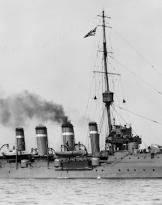The progressive increase in tension between the central empires and the Entente nations and the growing popular ferment, fueled by the Futurist movement, advised the Revel to promote and accelerate all the actions necessary to prepare the Marine Registries for an almost safe entry into the war , despite the 2 August 1914 Italy declared its neutrality.
The Fleet maneuvers, planned just for the August of the '14, and whose theme had been programmed realistically with a scenario of real war, were canceled. At the same time all the naval forces were concentrated in Taranto, the only base able to host them in safety.
From that August a hundred years ago, therefore, the Regia Marina began a period of preparation of the means and training of the personnel that allowed it to be ready for hostilities, the 23 May of the following year.
Paolo Thaon of Revel immediately sensed that if Italy had entered the war, it would have done so alongside the Entente.
 Therefore, demanding the Italian competence in command of naval operations in the Adriatic, had to devise any action aimed at equalizing the geo-strategic superiority of Austria. The conformation of the coasts gave, in fact, a notable superiority to the central empires that could count on a jagged coast and scattered of islands and islets that gave fast and sure landing to the enemy fleet.
Therefore, demanding the Italian competence in command of naval operations in the Adriatic, had to devise any action aimed at equalizing the geo-strategic superiority of Austria. The conformation of the coasts gave, in fact, a notable superiority to the central empires that could count on a jagged coast and scattered of islands and islets that gave fast and sure landing to the enemy fleet.
With extreme foresight, the attention was turned to the subtle ships, submarines, aircraft, underwater weapons, mines and their laying and dredging, to men and to the material in general both in terms of numbers and quality. Furthermore, maximum care was taken to reorganize the air defense, the protection of ports and coasts with the construction of trains and armed pontoons.
All at the expense of large battleships. These strategic choices, which at the time did not spare him harsh criticism, proved to be successful. Although the great resolving battle on the sea was hoped for, the Royal Navy in fact, during the long conflict, had to conduct an enervating wait war of vigilance, surveillance and ambushes.
Premuda's undertaking, 10 June 1918, effectively sanctioned the superiority of Italy and delivered the final victory to the Entente nations.

Source: Military Navy












